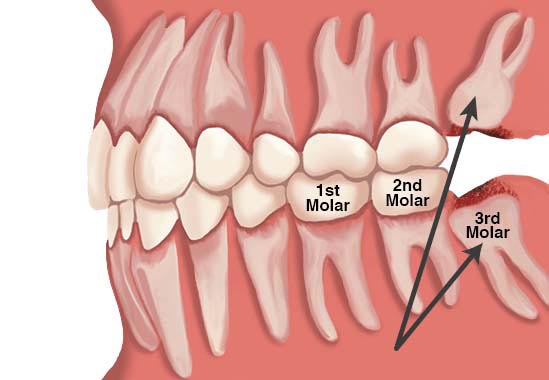Wisdom Tooth Extraction
Introduction
Wisdom teeth or third molars come through either in the late teens or early twenties, although sometimes this can occur later in life. In some cases there is not enough room in the mouth for these molars. As a result, they crowd the molar next to it causing pain and swelling. Sometimes the wisdom teeth become impacted which means they are unable to break through the surface of the gum. This causes irritation of the gum and decay of adjacent molars. They also need to be removed if they are decayed, cause pain or have a cyst or infection.
For removal of wisdom teeth, the dentist usually orders panoramic view of X-ray.
Teeth removed before age 20 have less developed roots and extraction at this time may result in fewer complications. Therefore, the dentist may recommend the extraction of wisdom tooth before any problems develop. Removal of crowded or impacted wisdom teeth does not affect the bite or oral health in the future.
Iran offers a superior Dental treatments that is world best quality. For patients from the USA, and Europe for example, the savings can be 60% or more

Referral to specialist:
The dentist, or a primary physician first consulted usually recommends and refers the patient to a suitably trained and skilled dentist or maxillofacial surgeon. Alternatively in some circumstances your own general dentist may perform the procedure.
Preparation before wisdom tooth extraction
1. For removal of wisdom teeth, the dentist usually orders panoramic view of X-ray. This view is important for determining the relationship of wisdom tooth to other teeth, to sinuses and nerves as well as presence of any tumors or bone disease.
2. Full medical and dental history and a list all medicines (prescription and over-the-counter drugs, vitamins and supplements) taken by the patient must be informed to the dentist.
3. Some doctors may prescribe antibiotics to be taken before and after surgery. This practice varies by the dentist or oral surgeon. Antibiotics are likely to be given in case of: The patient may have intravenous (IV) anesthesia, which can range from conscious sedation to general anesthesia. This is discussed with the patient.
• The patient has infection at the time of surgery
• Weakened immune system
• A long surgery is expected
• The patient has specific medical conditions
4. Clothing with short sleeves or sleeves that can be rolled up easily is recommended. This allows access for an IV line to be placed in a vein.
5. Don’t eat or drink anything for six or eight hours before the procedure.
6. History of cough, stuffy nose or cold up to a week before the surgery should be informed to the doctor. The doctor may want to avoid anesthesia until the cold subsides.
7. After the extraction, someone will need to drive the patient home and stay there.
On arrival in hospital or clinic:
After admission to the hospital, the necessary paperwork is done. Prior to the surgery, the patient is asked to sign a consent form regarding the procedure and its possible complications.
Procedure:
1. An intravenous line usually put in the back of the hand to receive a sedative injection. The anesthetist will generally discuss the anesthetic procedure with the patient.
2. Depending on position of the tooth and complexity of the case, the dentist advises whether the extraction is to be performed under local or general anesthesia.
3. A wisdom tooth which is fully erupted through the gum can usually be extracted with the same process as any other tooth.
4. However, when the tooth is underneath the gums and embedded in the jawbone, an incision in the gum and removal of bone lying over the tooth by an instrument known as osteotome is required.
5. As the extraction procedure is finished, the oral surgeon closes the incision using dissolvable sutures and covers the wound with gauze pads which are called as dental packs.
After wisdom tooth extraction surgery:
1. The patient wakes up in a recovery area where he or she is closely monitored by nursing staff until the effect of anesthesia wears off. Mouth may still be numb when you wake up.
2. Most people go home on the same day or may stay overnight, depending on the procedure and anesthesia used.
3. The hospital staff gives specific instructions to the patient about any side effects expected and any symptoms for which further assistance should be sought.
4. The specialist usually advices about resuming eating and drinking after the surgery, managing pain relief and other aspects of dental care to be followed after going home.
5. In most cases, the recovery period lasts only for a few days.